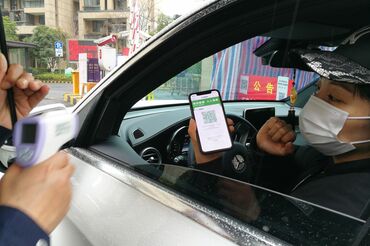The to-do list
 With so much insecurity and mounting crisis, there's no time now to think about a lot of things that will matter later. But someday there will be. And at that time...
With so much insecurity and mounting crisis, there's no time now to think about a lot of things that will matter later. But someday there will be. And at that time...
Remember that health workers - doctors, nurses, technicians, ambulance drivers - matter just as much every day as they do during a crisis. Six months after everyone starts feeling safe and starts to forget, remind them how much we owe health workers..
The same goes for other essential services workers, the ones who keep the food stores open, the garbage and recycling being picked up, who harvest the crops, catch the fish, and raise and slaughter the animals and birds, who drive the trucks and supply the stores, and deliver post, takeout, and packages from Amazon et. al, and keep the utilities running, and the people who cook the takeout food, and clean the hospitals and streets. Police. Fire. Pharmacists. Journalists. Doubtless scores of other people doing things I haven't thought of. In developed countries, we forget how our world runs until something breaks, evidenced by Steve Double (Con-St Austell and Newquay), the British MP who said on Monday, "One of the things that the current crisis is teaching us is that many people who we considered to be low-skilled are actually pretty crucial to the smooth running of our country - and are, in fact, recognised as key workers." (Actually, a lot of us knew this.)
Stop taking travel, particularly international travel, for granted. Even when bans and lockdowns are eventually fully lifted, it's likely that pre-boarding and immigration health checks will become as routine as security scanning and showing ID have since 2001. Even if governments don't mandate it the public will demand it: who will sit crammed next to a random stranger unless they can believe it's safe?
Demand better travel conditions. Airlines are likely to find the population is substantially less willing to be crammed in as tightly as we have been.
Along those lines, I'm going to bet that today's children and young people, separated from older relatives by travel bans and lockdowns in this crisis, will think very differently about moving across the country or across the world, where they might be cut off in a future health crisis. Families and friends have been separated before by storms, earthquakes, fires, and floods - but travel links have rarely been down this far for this long - and never so widely. The idea of travel as conditional has been growing through security and notification requirements (I'm thinking of the US's ESTA requirements), but health will bring a whole new version of requiring permission.
Think differently about politicians. For years now it's been fashionable for people to say it doesn't matter who gets in because "they're all the same". You have only to compare US governors' different reactions to this crisis to see how false that is. As someone said on Twitter the other day, when you elect a president you are choosing a crisis manager, not a friend or favorite entertainer.
Remember the importance of government and governance. The US's unfolding disaster owes much of its amplitude to the fact that the federal government has become, as Ed Yong, writing in The Atlantic, calls it, "a ghost town of scientific expertise".
Stop asking "How much 'excess' can we trim from this system?" to asking "What surge capacity do we need, and how can we best ensure it will be available?" This will apply not only to health systems, hospitals, and family practices but to supply chains. The just-in-time fad of the 1990s and the outsourcing habits of the 2000s have left systems predictably brittle and prone to failure. Much of the world - including the US - depends on China to supply protective masks rather than support local production. In this crisis, Chinese manufacturing shut down just before every country in the world began to realize it had a shortage. Our systems are designed for short, sharp local disasters, not expanding global catastrophes where everyone needs the same supplies.
Think collaboratively rather than competitively. In one of his daily briefings this week, New York State governor Andrew Cuomo said forthrightly that sending ventilators to New York now, as its crisis builds, did not mean those ventilators wouldn't be available for other places where the crisis hasn't begun yet. It means New York can send them on when the need begins to drop. More ventilators for New York now is more ventilators for everyone later.
Ensure that large companies whose policies placed their staff at risk during this time are brought to account.
Remember these words from Nancy Pelosi: "And for those who choose prayer over science, I say that science is the answer to our prayers."
Reschedule essential but timing-discretionary medical care you've had to forego during the emergency. Especially, get your kids vaccinated so no one has to fight a preventable illness and an unpreventable one at the same time.
The final job: remember this. Act to build systems so we are better prepared for the next one before you forget. It's only 20 years since Y2K, and what people now claim is that "nothing happened"; the months and person-millennia that went into remediating software to *make* "nothing" happen have faded from view. If we can remember old movies, we can remember this.
Illustrations: Dooley Wilson, singing "As Time Goes by", from Casablanca (1942).
Wendy M. Grossman is the 2013 winner of the Enigma Award. Her Web site has an extensive archive of her books, articles, and music, and an archive of earlier columns in this series. Stories about the border wars between cyberspace and real life are posted occasionally during the week at the net.wars Pinboard - or follow on Twitter.


